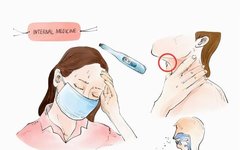Click the blue words to follow Shengkang Traditional Chinese Medicine
Coughing is the most common symptom of the human respiratory tract, belonging to the body’s self-defense mechanism, which is a process of expelling bacteria, viruses, phlegm, and other substances from the respiratory tract.
In Traditional Chinese Medicine (TCM), coughs are classified into common types such as Wind-Cold (Feng Han), Wind-Heat (Feng Re), Phlegm-Damp (Tan Shi), Phlegm-Heat (Tan Re), and Lung Yin Deficiency (Fei Yin Xu). Each type has different dietary therapy methods, and TCM treatment must be based on syndrome differentiation to achieve good therapeutic effects.
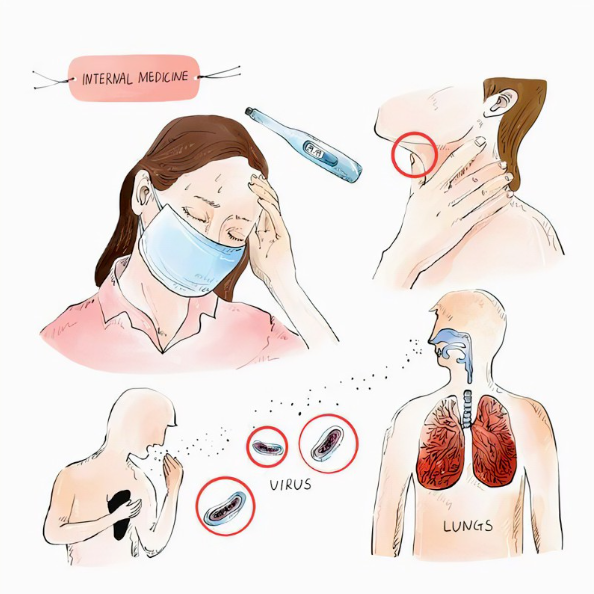
01Wind-Cold Cough (Feng Han Ke)
Initially, there are no specific clinical manifestations, generally presenting as thin white phlegm, itchy throat, often accompanied by aversion to wind and cold, nasal congestion, clear nasal discharge, sneezing, and a thin white tongue coating.
Methods to stop the cough include dispersing the lung and relieving the exterior, expelling wind and dispersing cold. Chinese patent medicines can include Tongxuan Li Fei Wan or Feng Han Ke Sou Wan, Xiao Qing Long He Ji, etc.; daily remedies can include boiling ginger, garlic, and scallions in water, which have the effect of dispersing the lung and relieving the exterior, expelling wind and dispersing cold; avoid raw, cold, greasy, and fatty foods.
Dietary therapy: Take 6 grams of fresh ginger, 6 grams of perilla leaves (Su Ye), and 10 grams of apricot kernels (Xing Ren), add an appropriate amount of water, and decoct for about 15 minutes, strain to obtain the juice, and add a little honey to take warm in portions.
02Wind-Heat or Phlegm-Heat Cough (Feng Re or Tan Re Ke)
Generally presents with sore throat, yellow thick nasal discharge, yellow thick phlegm, dry throat, thirst, and a red tongue with a yellow coating.
Methods to treat include dispersing wind and clearing heat, and relieving cough. Chinese patent medicines can include Yin Qiao Jie Du Wan, Chuan Bei Pi Pa Lu, Ji Zhi Tang, She Dan Chuan Bei Ye, etc.; daily remedies can include brewing mint, Luo Han Guo, Pang Da Hai, and Chrysanthemum; avoid fatty, fishy, oily, and spicy foods.
Dietary therapy: Take one pear, 8 grams of Platycodon (Jie Geng), and 5 grams of Chuan Bei, decoct together for about 10 minutes, strain to obtain the juice, and add rock sugar to consume.
03Phlegm-Damp Cough (Tan Shi Ke)
Often presents with abundant phlegm, thin white phlegm, often accompanied by indigestion, nausea, vomiting, chest fullness, heaviness, white greasy tongue coating, and a slippery pulse.
Methods to treat include strengthening the spleen, drying dampness, and expelling phlegm to stop cough. Chinese patent medicines can include Er Chen Wan, Chen Xia Liu Jun Wan, and Ju Hong Wan; daily remedies can include brewing tangerine peel, Poria (Fu Ling), and Buddha’s hand; pay attention to protecting the spleen and stomach, avoiding raw, cold, and greasy foods.
Dietary therapy: Take an appropriate amount of white radish, scallions, fresh ginger, and tangerine peel, first cook the radish until soft, then add scallions, ginger, and tangerine peel, and cook for another five minutes, consume with the dregs.
04Lung Yin Deficiency Cough (Fei Yin Xu Ke)
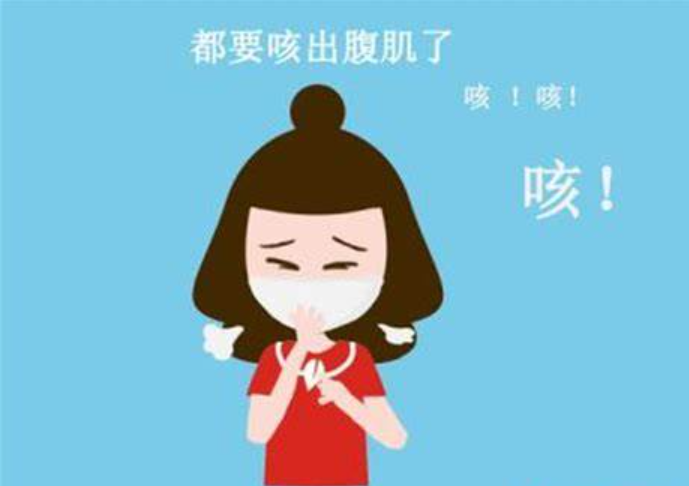
Generally presents with dry cough with little phlegm, dry throat and tongue, blood-streaked phlegm, hoarse voice, often with emaciation, tidal fever, night sweats, and a red tongue with little coating.
Methods to treat include nourishing yin, moistening dryness, and transforming phlegm to stop cough. Chinese patent medicines can include Yang Yin Qing Fei Wan, Snow Pear Syrup, Bai He Guo Jin Wan, etc.; dietary recommendations should be light and moist, such as snow pears, Mai Dong, Sha Shen, and Yu Zhu, avoiding spicy and heating foods.
Dietary therapy: Take one white fungus, soak and prepare it, take 10 grams of lily (Bai He) and 10 grams of Mai Dong, add water and boil for about half an hour, then add the white fungus and continue to cook for ten minutes, adding an appropriate amount of rock sugar to adjust for consumption.
05Qi Deficiency Cough (Qi Xu Ke)
Often presents with persistent cough, thin white phlegm, pale complexion, poor resistance, aversion to cold and wind, shortness of breath, and a pale white tongue.
Methods to treat include tonifying qi, nourishing the lungs, and expelling wind to stop cough. Chinese patent medicines can include Yu Ping Feng Ke Li, Bu Zhong Yi Qi Wan; avoid raw and cold foods.
Dietary therapy: Take an appropriate amount of japonica rice, 15 grams of Astragalus (Huang Qi), 10 grams of Bai Zhu, and 6 grams of Fang Feng, first boil the herbs, strain to obtain the juice, and use the medicinal water to cook the porridge.

Additionally, a cough that persists after a cold is often related to underlying Yang deficiency and Qi deficiency, compounded by the use of cold medicines or antibiotics, leading to blockage of cold qi;
Common symptoms include clear, thin phlegm, itchy throat, aversion to wind and cold, and dietary coldness can exacerbate symptoms, often with a pale tongue, no thirst, and no sore throat; treatment should focus on dispersing the lung, expelling cold, relieving itching, and transforming phlegm; methods that clear heat, nourish yin, or astringe are not suitable.
It is also important to note that the spleen and stomach are the source of phlegm production; some individuals with poor spleen and stomach function may experience recurrent cough with thin white phlegm, and simply transforming phlegm may not resolve the issue; strengthening the spleen and stomach is necessary to eliminate the source of phlegm. In this case, Chen Xia Liu Jun Tang (Wan) can be chosen, which has the effect of strengthening the spleen and stomach and transforming phlegm.
The phenomenon of cough and phlegm after a cold is most commonly one of the types mentioned above. Everyone can choose appropriate Chinese patent medicines and dietary therapy methods under the guidance of a physician based on their condition.
To cope with cough, prevention is key. Pay attention to enhancing physical fitness, improving body immunity, maintaining regular meals, and ensuring a balanced diet.
No matter what type of cough one has, it is important to maintain a light diet, consuming foods that help transform phlegm and stop cough; avoid seafood, greasy, and spicy foods, and dishes should not be overly salty or sweet, which is beneficial for a speedy recovery from cough!
Reminder: This article is for health education purposes, for readers’ reference and learning. TCM diagnosis and treatment require syndrome differentiation; do not use a one-size-fits-all approach. If you experience any discomfort, please seek medical attention promptly.
Note: Some images and texts are sourced from the internet. If there is any infringement, please contact for removal.
Doctor
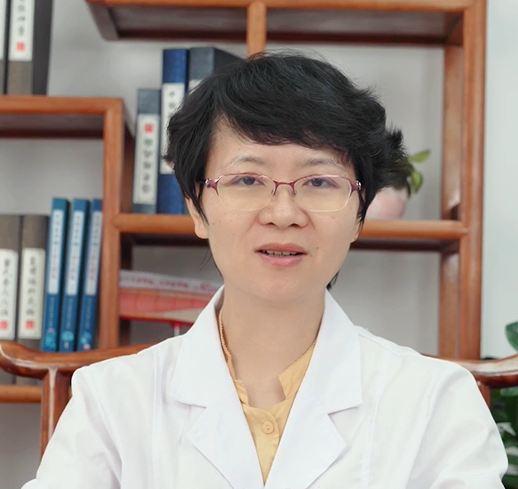
Hong Min
Respiratory Department
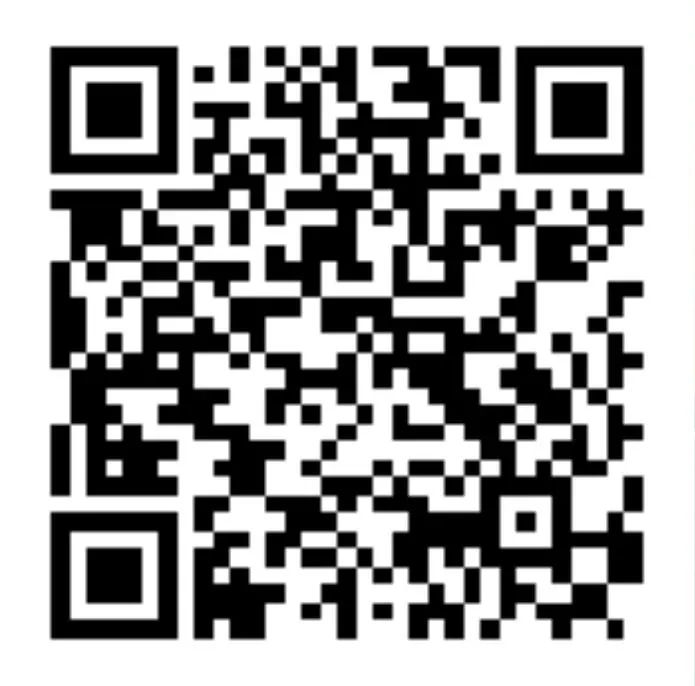
Long press the QR code to make an appointment
Personal Profile
Hong Min, Master of Medicine, Director of the TCM Department at the First Affiliated Hospital of Guangdong Pharmaceutical University, a public tertiary hospital in Guangzhou, professor, engaged in clinical practice of TCM for cough and asthma for nearly 30 years. Graduated from Guangzhou University of Chinese Medicine, with a research focus on using classical formulas to prevent and treat diabetes and its complications, and has unique insights into cough and asthma, gastrointestinal diseases, acne, eczema, urticaria, migraines, menstrual disorders, sub-health, hyperlipidemia, geriatric diseases, cervical spondylosis, and post-operative chemotherapy for tumors, adept at using classical formulas combined with traditional therapies for these diseases, achieving excellent results, especially skilled in the TCM diagnosis and treatment of deficiency-cold syndromes.
With a deep respect for life and a love for traditional Chinese culture and the art of Qi Huang, I have been diligently working on the clinical front lines for over ten years, engaging in TCM, integrated Chinese and Western medicine clinical practice, teaching, and research.
Specialties
Diagnosis and treatment of common and difficult diseases in internal medicine, gynecology, pediatrics, dermatology, etc., especially skilled in using classical formulas and advocating pure herbal treatments for cough, external pathogens, gastrointestinal diseases, urticaria, eczema, atopic dermatitis, menopausal syndrome, menstrual disorders, polycystic ovary syndrome, sub-health, etc., with significant efficacy.
1. Common internal diseases: colds, coughs, bronchitis, rhinitis, gastritis, gastric ulcers, enteritis, diarrhea, constipation, hypertension, diabetes, hyperlipidemia, insomnia, dizziness, headaches, rheumatism, gout, etc.;
2. Pediatric cough, rhinitis, diarrhea, constipation, indigestion, spleen and stomach deficiency, developmental disorders, enuresis, etc.;
3. Gynecological disorders such as irregular menstruation, dysmenorrhea, uterine fibroids, and polycystic ovary syndrome.
For more information on TCM issues, long press the QR code to follow the public account.



